
Studia Austriaca
Scope & Guideline
Illuminating the Path of Austrian Literary Contributions
Introduction
Aims and Scopes
- Interdisciplinary Literary Analysis:
The journal focuses on the intersection of literature with history, philosophy, and cultural studies, encouraging authors to draw connections across different fields to enrich the understanding of Austrian texts. - Exploration of Memory and Identity:
A significant emphasis is placed on themes of memory, identity, and the autobiographical, particularly in relation to marginalized voices and historical contexts, reflecting on how personal narratives shape collective memory. - Cultural and Historical Contextualization:
Studia Austriaca seeks to contextualize literary works within broader cultural and historical frameworks, examining how Austrian literature interacts with national and international movements. - Focus on Autobiography and Personal Narratives:
The journal highlights the importance of autobiographical texts and personal narratives as vital sources for understanding individual and national identities, particularly in the Austrian context. - Critique of Modernism and Postmodernism:
The journal engages with both modernist and postmodernist themes, analyzing their manifestations in Austrian literature and the cultural implications thereof.
Trending and Emerging
- Digital and Visual Narratives:
There is a growing focus on digital media and visual narratives, particularly in the context of how these forms interact with traditional literary practices and memory, as seen in the analysis of home videos and digital storytelling. - Intergenerational Memory and Trauma:
Recent publications highlight the significance of intergenerational memory, particularly related to traumatic historical events, reflecting a broader societal interest in how past experiences shape current identities. - Postcolonial and Transnational Perspectives:
Emerging themes include postcolonial critiques and transnational perspectives that examine Austria's historical and cultural connections beyond its borders, indicating a shift towards a more global understanding of Austrian literature. - Critical Engagement with Contemporary Issues:
The journal has increasingly addressed contemporary social issues, such as nationalism, migration, and identity politics, reflecting the relevance of literature in discussing current societal challenges.
Declining or Waning
- Traditional Historical Narratives:
There is a noticeable decline in papers that strictly adhere to traditional historical narratives without integrating contemporary analytical frameworks or interdisciplinary approaches. - Canonical Texts in Isolation:
The journal has seen a waning interest in the analysis of canonical texts in isolation, with fewer articles focusing solely on established authors or works without considering their broader cultural or historical implications. - Static Interpretations of National Identity:
Themes that explore national identity in a static or singular manner are becoming less common, as the discourse shifts towards more nuanced and dynamic interpretations of identity that incorporate global and transnational perspectives.
Similar Journals
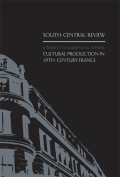
South Central Review
Fostering Scholarly Dialogue Across DisciplinesSouth Central Review, a distinguished academic journal published by Johns Hopkins University Press, serves as a vital platform for scholarly discourse in the fields of cultural studies, literature and literary theory, philosophy, and the visual and performing arts. With an ISSN of 0743-6831 and an E-ISSN of 1549-3377, this journal is dedicated to highlighting innovative research and critical analyses that explore the complexities of Southern culture and its broader implications. Although it operates without an open access option, the journal is recognized for its rigorous peer-review process and contributions to contemporary academic dialogue, holding Q3 and Q4 rankings across several disciplines as of 2023. The convergence of ideas and perspectives from diverse academic backgrounds positions the South Central Review as an essential resource for researchers, professionals, and students seeking to deepen their understanding of the cultural narratives shaping our world today.

Quetes Litteraires
Elevating Diverse Voices in Literature and HistoryQuetes Litteraires, published by the John Paul II Catholic University of Lublin, is an open-access journal dedicated to exploring the intricate realms of literature, history, and literary theory. The journal, identified by ISSN 2084-8099 and E-ISSN 2657-487X, has been a significant platform for scholarly discourse since its inception in 2017, contributing to the ongoing dialogue in these fields, particularly within Poland and beyond. As of 2023, it holds Q4 status in both History and Literature and Literary Theory categories, indicating a commitment to inclusivity and diversity of thought, welcoming submissions from a wide array of voices and perspectives. With a current Scopus rank placing it within the lower quartiles of its fields, Quetes Litteraires aims to elevate underrepresented scholarship and foster collaborative research endeavors. Researchers, professionals, and students will find this journal a valuable resource for insightful articles, critical analyses, and thought-provoking discussions that push the boundaries of literary and historical studies.
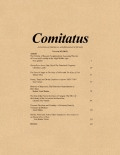
COMITATUS-A JOURNAL OF MEDIEVAL AND RENAISSANCE STUDIES
Innovating Perspectives in Historical ResearchCOMITATUS: A Journal of Medieval and Renaissance Studies, published by the University of California Center for Medieval and Renaissance Studies, serves as a critical platform for exploring the complexities of medieval and Renaissance eras through diverse scholarly lenses. With an ISSN of 0069-6412 and a dedicated E-ISSN of 1557-0290, this journal operates primarily in the United States, delivering rigorous academic discourse aimed at historians, literary critics, and art scholars alike. Although currently classified in the Q4 category within its fields in 2023, including History, Literature and Literary Theory, and Visual Arts and Performing Arts, COMITATUS invites submissions that challenge prevailing narratives and introduce innovative perspectives on cultural phenomena. It has been publishing since 2002 with periods of convergence spanning from 2002 to 2009, and from 2017 to 2023. The journal's commitment to open dialogue and research dissemination makes it an essential resource for students, professionals, and researchers interested in medieval and Renaissance studies, fostering a deeper understanding of these pivotal historical periods.

Caietele Echinox
Empowering Scholars to Shape the Future of Imagination StudiesCaietele Echinox is an esteemed open-access journal dedicated to the fields of literature, cultural studies, and imagination research, published by the University Babeș-Bolyai in Romania. Inaugurated in 2023 as an open-access platform, this journal strives to foster interdisciplinary dialogue and scholarly exploration, making its rich content accessible to a global audience. Housed within the Phantasma Center for Imagination Studies, Caietele Echinox aims to publish innovative research that examines the intersections of culture, imagination, and literature, thereby contributing to the broader understanding of human thought and artistic expression. With a commitment to high-quality scholarship, it invites contributions from researchers, professionals, and students, ensuring that vital discussions in these dynamic fields remain at the forefront of academic inquiry. By leveraging the latest in open-access publishing, Caietele Echinox stands as a crucial resource for those looking to engage with contemporary issues and themes in literary and cultural studies.
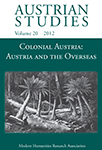
Austrian Studies
Exploring the Depths of Austrian Culture and IdentityAustrian Studies, published by the Modern Humanities Research Association, stands as a unique and essential platform for scholarly work focusing on the diverse aspects of Austrian culture, history, and politics. With its ISSN 1350-7532 and E-ISSN 2222-4262, this journal operates from its headquarters in the United Kingdom, offering a rich tapestry of interdisciplinary research to its readers. Although it currently lacks an open access model, it continues to contribute significantly to fields such as Cultural Studies, History, Political Science, and Visual Arts, as evidenced by its categorization in the fourth quartile in 2023. Despite its modest rankings in Scopus, where it falls within the lower percentiles across various categories, Austrian Studies encourages innovative discourse and exploration of pivotal themes in Austrian identity and scholarship. Researchers, professionals, and students alike will find this journal a valuable resource for deepening their understanding of Austria’s multifaceted cultural landscape.

Acta Literaria
Connecting Innovators in the World of LiteratureActa Literaria is a distinguished journal published by the Universidad de Concepción, Facultad de Humanidades y Arte, focusing on the intricate domains of literature and literary theory. With an ISSN of 0717-6848, this Chilean journal has been a vital contributor to the scholarly discourse in its field since its inception in 2007. Although currently categorized in the Q4 quartile for the year 2023 and holding a Scopus rank of #860 out of 1106 in the Arts and Humanities section, Acta Literaria plays a crucial role in fostering dialogue and exploration among researchers, professionals, and students alike. The journal aims to facilitate the exchange of innovative ideas, critical analyses, and diverse perspectives on literature, making it an indispensable resource for anyone engaged in literary studies. While it does not offer open access, the journal's commitment to upholding academic rigor ensures that it remains a respected platform for scholarly publication.

MESTER
Exploring the Nexus of Language, Culture, and TheoryMESTER is a distinguished academic journal published by the UCLA College of Humanities, known for its commitment to advancing research in the fields of Cultural Studies, Linguistics and Language, and Literature and Literary Theory. With an ISSN of 0160-2764, this journal serves as a vital platform for scholars and professionals to disseminate innovative research and critical perspectives from diverse theoretical frameworks and cultural contexts. Although currently operating without an Open Access model, MESTER continues to uphold a rigorous peer-review process, ensuring that published articles maintain high academic standards. Recognized for its selective focus, MESTER holds a Q4 categorization in Cultural Studies and Linguistics, and Q3 in Literature and Literary Theory, situating it as a relevant, if emerging, voice within these disciplines. Housed within the significant repository of knowledge at UCLA, the journal beckons researchers, students, and practitioners to engage with its contributions to the humanities and build upon its foundations in cultural discourse.
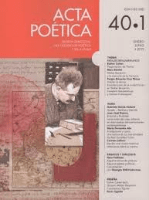
Acta Poetica
Fostering Global Conversations in Literature and CultureActa Poetica is a distinguished open-access journal dedicated to advancing research and scholarship in the fields of Cultural Studies and Literature and Literary Theory. Published by the Universidad Nacional Autónoma de México through its Instituto de Investigaciones Filológicas, this journal has been a pivotal platform for the dissemination of literary discourse since it embraced open access in 1979. With a notable presence in both the social sciences and humanities, Acta Poetica has earned a ranking of Q3 and Q2 in the 2023 category quartiles, reflecting its commitment to quality scholarship. The journal invites contributions from researchers, professionals, and students alike, fostering a rich dialogue that explores the nuances of literary criticism and cultural phenomena. With its ISSN 0185-3082 and E-ISSN 2448-735X, the journal aims to make valuable research accessible to a global audience, continuing its legacy of enhancing literary scholarship from its base in Mexico City.

LITERATUR UND KRITIK
Bridging Tradition and Innovation in Literary CritiqueLITERATUR UND KRITIK, published by Otto Muller Verlag, stands as a significant journal in the field of Literature and Literary Theory. This Austrian journal, with its ISSN 0024-466X, offers a platform for critical examination, analysis, and discourse on literature from various historical and cultural contexts. Despite its current standing in the Q4 category of literature rankings, it provides an invaluable resource for researchers and practitioners committed to exploring the evolving landscape of literary criticism. This journal is particularly notable for its convergence of scholarly thought from 2009 to 2024, fostering a rich dialogue among academics, critics, and students alike. While it does not offer open access, its valuable insights into contemporary and historical literary studies make it a respected source within the academic community. The journal ensures that contributors and readers alike engage deeply with significant literary themes, nurturing both scholarly and creative pursuits.
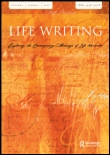
Life Writing
Navigating the Intersection of Life and LiteratureLife Writing, published by Routledge Journals, Taylor & Francis Ltd, is a prestigious academic journal dedicated to the field of Literature and Literary Theory. With an impressive impact factor and listed in the top quartile (Q1) of its category, it ranks #91 out of 1106 in the Scopus database, placing it in the 91st percentile – a testament to its significant influence and reach within the academic community. Since its inception in 2004, Life Writing has provided a vital platform for scholars and practitioners to explore the nuances of life writing across various genres and cultures. The journal emphasizes critical and theoretical approaches while promoting innovative research, making it an essential resource for researchers, professionals, and students alike. With a commitment to advancing the discourse on autobiographical narratives, memoirs, and biographies, Life Writing fosters a rich, interdisciplinary dialogue that is crucial for understanding personal and collective identities in contemporary literature.